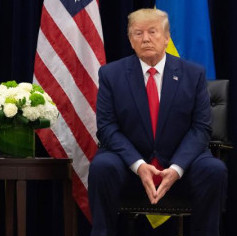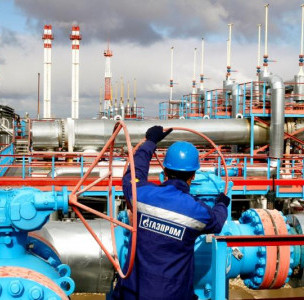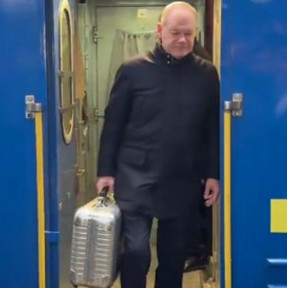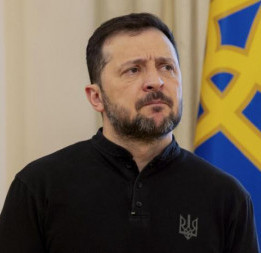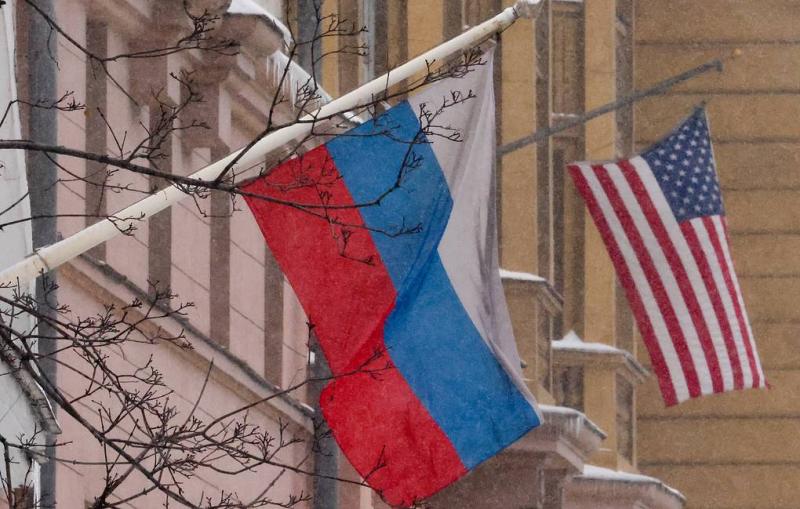
- Press review: Ukraine gets ready to host foreign troops as US prepares for trade war
- Press review: EU, UK weigh new sanctions on Russia as Trump’s threat to Iran may spark war
- Press review: Germany mulls Nord Stream restoration as Zaporozhye NPP sparks talks
- Press review: Kiev challenges Black Sea deal as the US reasserts China as its top rival
Discussions on rare earth minerals could enhance political dialogue between Russia and the US; Syria’s authorities establish the first government after Bashar Assad’s ouster; and the EU seeks to expand its influence in Central Asia. These stories have topped Monday’s newspaper headlines across Russia.
Izvestia: Talks on rare earth minerals could enhance Russia-US political dialogue
Moscow and Washington have launched discussions of projects related to Russia’s rare earth minerals, Russian Direct Investment Fund (RDIF) CEO Kirill Dmitriev told Izvestia. According to him, US companies have already shown an interest in potential agreements. Notably, Russian and US officials are discussing economic cooperation as part of resumed consultations, with the next round reportedly set for mid-April.
US President Donald Trump stated earlier that Washington was interested in Russia’s rare earth elements and other resources. Russian leader Vladimir Putin, in turn, said that Moscow was ready to offer cooperation to the US in terms of extracting rare earth minerals.
Russia and the US could have significant prospects for the extraction and processing of rare earth minerals. Political relations between the two countries have somewhat thawed already, and a key point to remember in this regard is that the US depends on the imports of these elements, industrial expert Leonid Khazanov pointed out.
However, several factors could hinder cooperation. First, sanctions on Russia are still in place, and the US continues to provide support to Ukraine. Second, Washington will have to allow American companies to invest in Russian deposits. And finally, such projects are complex and costly and will also require a lot of time to implement. Rare earth deposits are located in remote areas, which means that money will need to be spent on the construction of production and support facilities, Khazanov specified.
Meanwhile, the parties’ interest in economic cooperation could strengthen political dialogue between Russia and the US. According to NBC News, Trump plans to hold another phone call with Putin soon. In addition, the next round of Russia-US consultations on resolving the conflict in Ukraine may take place in the Saudi capital of Riyadh in the middle of April, media outlets report.
Vedomosti: Syrian authorities form first government after Bashar Assad’s removal
Syria's interim President Ahmed al-Sharaa has appointed a new government, which consists of 23 ministers, including a woman. Al-Sharaa himself will serve as prime minister, Vedomosti reports.
The new cabinet is mostly made up of technocrats and former opponents of the country’s ousted leader, Bashar Assad. Moreover, it includes a few representatives of Syrian minorities. In particular, an Alawite has been appointed as transport minister and a Druze has taken the helm of the Agriculture Ministry. The only woman in the cabinet - the minister of social affairs and labor - belongs to the Christian community. However, there are no Kurds in the government, even though Damascus and the Kurdish autonomy in northeastern Syria reached an agreement on March 10 about integrating Kurdish civilian and military institutions into nationwide ones.
Middle East expert Ruslan Suleimanov doubts that the formation of a new cabinet will stabilize the situation in Syria. He points out that since the Islamic group Hay'at Tahrir al-Sham (HTS, designated as a terrorist organization and outlawed in Russia) seized power, thousands of militants that Damascus does not control have remained active in the country. "Unfortunately, internal conflicts are inevitable in the future. Additionally, it’s not clear how the integration of the Kurds is going to be carried out. Still, the formation of a formally inclusive government may give rise to some hope," the expert added.
People who are not HTS members were included in the cabinet following developments in northwestern Syria, where clashes took place between government forces and armed Alawite units, causing mass civilian casualties, Andrey Zeltyn, a senior lecturer at the Higher School of Economics’ School of Asian Studies, explained. This is how the new Syrian authorities are trying to ease tensions in society and secure support from Western countries, if possible.
As for relations with Russia, Damascus has been demonstrating an interest in developing ties with Moscow, Suleimanov emphasized. This stems from the need to maintain a military and political balance and a counterweight against Turkey and the US, which, along with Russia, also have military bases in Syria, the expert elaborated.
Izvestia: EU seeks to expand influence in Central Asia
The European Union has stepped up efforts to increase its influence in Central Asia, with one of the objectives being to drive Russia and China out of the region. However, the EU’s attempts to strengthen its position in the region can hardly be seen as a success, said experts interviewed by Izvestia.
Uzbekistan's city of Samarkand will host the EU-Central Asia Summit on April 3-4, with European Commission President Ursula von der Leyen taking part in the event for the first time. The Uzbek president will preside over the summit, which will also involve the leaders of Kazakhstan, Kyrgyzstan, Tajikistan, and Turkmenistan.
The EU is largely betting on logistics and energy programs that could tie the five countries of the region to the European system.
"The EU’s Global Gateway initiative is crucial in this regard, which was launched in 2021 as an alternative to China’s Belt and Road project," Darya Saprynskaya, a researcher with Moscow State University’s Institute of Asian and African Studies, observed.
However, Kazakhstan, Kyrgyzstan, Tajikistan, Turkmenistan, and Uzbekistan have always had close economic ties with Russia.
Cooperation takes place both at bilateral levels and on platforms such as the Eurasian Economic Union and the Commonwealth of Independent States. That said, the EU’s efforts to gain a foothold in the region can hardly be seen as a success, Stanislav Pritchin, head of the Central Asia Department at the Russian Academy of Sciences’ Institute of World Economy and International Relations, noted. "These efforts are rather limited because Kazakhstan is perhaps the only country for which the European Union is an important economic partner. As for others, geographical distance, a kind of passivity of businesses with regard to the region, and a poor understanding of its objectives and development goals, as well as a certain self-interest of European companies, limit the EU’s ability to become a full-fledged and influential actor in the region," the analyst explained.
Russia is present in Central Asia on a much wider scale, so the region should not be expected to suddenly shift focus toward Europe following the upcoming summit, Saprynskaya asserted. Russia accounts for over 30% of Central Asian nations’ trade. Despite Western sanctions, trade between Russia and the countries of the region continues to grow.
Meanwhile, there has also been a trend for the strengthening of internal ties in Central Asia in recent years. That said, the governments of Central Asian countries seek not to lose themselves while maintaining a multidimensional balance. Today, the region’s internal unity leads to cautiousness about the EU’s initiatives, Saprynskaya concluded.
Media: Myanmar earthquake may have diplomatic consequences
The March 28 earthquake may impact the political situation in Myanmar, where an ongoing civil war between a military junta, the supporters of the ousted government, and a number of ethnic groups has been going on since 2021, Vedomosti notes.
On March 29, the so-called National Unity Government, created after a military coup, announced a two-week cessation of hostilities in the earthquake-hit areas, except for defensive operations, and called for providing assistance to those affected by the quake through its institutions. The United Wa State Army, active in the state of Shan, also urged all parties to the armed conflict to declare a ceasefire.
The military and political conflict in Myanmar has a long history and cannot resolve on its own, said Alexey Kirichenko, associate professor at Moscow State University’s Institute of Asian and African Studies. However, the recent developments could make the people see that survival is more important than the fact who holds political power, the expert observed.
According to him, the country’s government will maintain its ground and there are even signs of people uniting around it. The organizations that are willing to take part in providing assistance to earthquake victims are asking the authorities to support their initiatives, Pyotr Kozma, a Myanmar-based independent expert on Southeast Asia, elaborated. However, the underground National Unity Government is actually trying to gain the initiative from the authorities, stressing that together with other "revolutionary forces," it controls more than half of the country, Kozma stressed.
The opposition, which does not recognize the government in Naypyidaw, will try to take advantage of the consequences of the earthquake, Alexey Maslov, Director of Moscow State University’s Institute of Asian and African Studies, told Izvestia. "They say that all military operations need to be stopped in the current situation. In theory, this could boost their rating," the expert said.
"Everything depends on how the government behaves. So far, it has been acting quite competently. The authorities have placed an emphasis on the people’s unity, which should solidify the people around Myanmar’s government. This is why I believe that no serious changes will take place in the near future," Maslov concluded.
Vedomosti: Analysts expect aluminum, copper prices to grow in 2025
Analysts expect that the costs of aluminum and copper - the key non-ferrous metals - will rise in 2025, Vedomost writes, citing data from the Kept consulting company.
Experts predict that average aluminum prices will increase by seven percent compared to last year due to the rising prices of the alumina commodity. In addition, prices are being supported by China’s decision to eliminate tax exemptions for aluminum exporters. Another factor that is pushing the metal’s price up is that Russia’s Rusal aluminum manufacturer plans to reduce production amid rising commodity prices. Besides, customs limitations are expected to be one more reason behind the rise in prices in 2025. The United States has imposed a 25% import tax on aluminum, while the European Union has announced a gradual ban on the import of Russian primary aluminum as part of its next package of sanctions.
According to Dmitry Baranov, a leading expert at the Finam Management company, this year, aluminum prices will depend on the needs of machinery manufacturing, the automotive industry, the construction industry, and the energy sector. Boris Krasnozhyonov, head of securities market analysis at Alfa-Bank, sees the Kept forecast for aluminum prices as "realistic," given the expenses that manufacturers have to bear amid high electricity and alumina rates.
As for copper, analysts expect prices to continue to rise this year due to active energy transition efforts and a trade standoff between China and the US. The large-scale use of copper in battery production and renewable energy projects is also boosting global demand, Krasnozhyonov notes.
Maxim Khudalov, chief strategist at the Vector Capital investment company, agrees that the price of aluminum is being impacted by new US restrictions. Copper prices will increase due to stable demand for equipment for data centers, which require more electricity, the analyst explained. The current level of non-ferrous metal prices remains comfortable for Russian companies, Khudalov concluded.
TASS is not responsible for the material quoted in these press reviews

